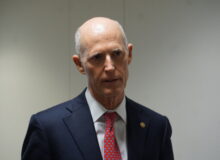Harmeet Dhillon, Republican National Committeewoman from California, treaded on legally murky ground, and certainly was culpable for improbity, when threatening on TV to withhold campaign contributions from Republican senators deemed insufficiently loyal to President Trump.
In a Sept. 27 interview on Fox Business News with Lou Dobbs, Dhillon responded to Dobbs’ question about why Republicans on Capitol Hill seemed to be lacking “passion… to defend this president,” by saying the RNC specifically is disappointed in “conservative senators scurrying away” on the issue. Then: “We will remember those folks Lou when they come calling for contributions. This is a time for everybody to stand together on our side.”
Now, granted, sometimes people say ill-considered things on the spur of the moment without real corrupt intent, especially when trying to talk tough politically. One random comment, unrepeated or unstressed, certainly does not make a federal case.
Dhillon, however, clearly was proud of her veiled threat to withhold campaign cash. At the web site of her law firm, the Dhillon Law Group, Dhillon posted not just the video, but also a verbatim transcript, of the interview. She did not modify the financial threat in any way. The effect was to further promote the idea of a financial quid pro quo: If they defend the president, they’ll get cash; if they don’t, they won’t.
So: She made the threat and effectively repeated it. If she or the RNC follows through on it by withholding donations an incumbent Republican senator otherwise would expect, it arguably would amount to illegality. The federal bribery statute makes it a crime if someone “directly or indirectly, corruptly gives, offers or promises anything of value to any public official” in ways related to official duties or defense of fraudulent activity. What Dhillon did was the double-negative of that: Rather than offer to give money if they do something, she threatened to withhold money if they don’t. In every other context, of course, a double-negative is a positive.
Last year when an outside group announced a very close parallel to his, namely raising money against U.S. Sen. Susan Collins of Maine while saying they would not actually bank and spend the money unless she voted for Supreme Court nominee Brett Kavanaugh, the Wall Street Journal and outside watchdog groups said it probably amounted to attempted bribery.
Legally, it’s certainly in the same zip code, and ethically, it’s on the same block. To be clear, without any actual follow-up to the threat, it almost certainly would not cross the line into bribery. Still, the repeated threat is in common (if not legal) parlance well within the realm of being extortionary.

Meanwhile, the hypocrisy is stunning. Within 70 seconds of blasting supposed “swamp creatures,” Dhillon did one of the most swampy things of all by specifically using the promise or threat of campaign cash to strong-arm senators into doing her bidding.
Somewhere we must have missed the memo explaining that the Trumpian imperative to shake up Washington, D.C. involved merely replacing one set of unethical, big-money influence peddlers for the old ones.
There can be no doubt that President Trump has entered uncharted and ethically dubious territory. Meanwhile, a decent respect to our institutions teaches that the consideration of presidential impeachment and removal is serious, sobering business. House and Senate members should conduct the process by marrying facts evidence to conscience and the Constitution. Financial inducements should play no role in it. For a party official like Dhillon to suggest otherwise may or may not be technically illegal, but is manifestly shameful.






